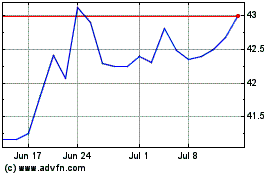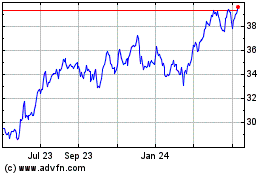Pipeline Operator Williams Comes Under Fire -- Update
April 07 2020 - 6:46PM
Dow Jones News
By Corrie Driebusch and Rebecca Elliott
An influential proxy adviser has taken the unusual step of
urging shareholders to withhold votes for the chairman of Williams
Cos. after the pipeline operator adopted a poison pill to fend off
unwanted suitors.
Institutional Shareholder Services Inc., or ISS, recommends
against supporting Williams Chairman Stephen Bergstrom in director
elections at the company's annual meeting April 28, according to a
client note from the proxy adviser that was viewed by The Wall
Street Journal. The report cites the "highly restrictive" nature of
the pill, which kicks in if an unwanted shareholder buys a stake of
just 5%.
Williams, whose pipelines transport oil and natural gas, on
March 19 joined a swell of more than 20 companies adopting poison
pills as their shares plunge amid the coronavirus pandemic.
Poison pills are antitakeover measures that can also be used to
neutralize shareholder activists. When an outsider buys up more
than a certain amount of the stock of a company with one, new
shares flood the market and make it more expensive to acquire a
controlling stake. Many investors frown on poison pills because
they can insulate companies from sometimes-beneficial outside
forces and suitors who might offer a significant takeover
premium.
The threshold for the Williams pill, which will remain in effect
until next March, is exceptionally low compared with others.
According to ISS, of the 14 companies that adopted poison pills
between March 13 and March 30, all of the others chose triggers
ranging from 10% to 20%. It calls the threshold for the Williams
pill "extremely rare."
The proxy firm adds that it recognizes this is a "unique time"
and it doesn't take a broad stand against implementing poison pills
in this environment. ISS recommends a "cautionary" vote for all
other Williams directors, including Chief Executive Alan
Armstrong.
A Williams spokeswoman called the ISS recommendation
"perplexing," saying in a written statement that the company's
board acted in the best interest of shareholders and that the 5%
trigger level isn't "highly restrictive." She added that Williams
reached out to major shareholders after adopting the pill and none
of them indicated that they would vote against any board members in
the coming election.
The Tulsa, Okla., company has said it adopted the pill in
response to its share-price decline, not because of a specific
threat.
Williams' stock fell more than 25% in March and was down more
than 40% since the start of the year as of Monday's close, battered
by the pandemic as well as a sharp decline in energy prices. The
company's market capitalization was about $16 billion as of
Monday.
Glass Lewis & Co., another major proxy adviser, has said it
doesn't believe shareholders ought to withhold votes from any board
members over the pill at this time.
Mr. Bergstrom is running unopposed on the director slate, so
there is little to no chance of his removal. Last year, nearly 99%
of investors voted for him, according to the ISS report. However,
ISS carries a lot of clout with big institutional shareholders and
a significant vote against the chairman would send a message to the
company as well as any others considering a similar move.
Sabastian Niles, a partner at law firm Wachtell, Lipton, Rosen
& Katz who advises corporate clients on activism and takeover
defense, said he tells companies that their pills should be
designed with circumstances that are specific to them in mind.
"ISS and institutional investors are not writing a blank check
and companies should not reflexively rush to adopt a pill
prematurely and without good reason," he said.
ISS criticizes Williams for what it says is a failure to
consider alternatives, such as a shorter-term pill or one with a
higher trigger level, and for not using its annual meeting to seek
shareholder ratification of the plan.
Write to Corrie Driebusch at corrie.driebusch@wsj.com and
Rebecca Elliott at rebecca.elliott@wsj.com
(END) Dow Jones Newswires
April 07, 2020 18:31 ET (22:31 GMT)
Copyright (c) 2020 Dow Jones & Company, Inc.
Williams Companies (NYSE:WMB)
Historical Stock Chart
From Mar 2024 to Apr 2024

Williams Companies (NYSE:WMB)
Historical Stock Chart
From Apr 2023 to Apr 2024
